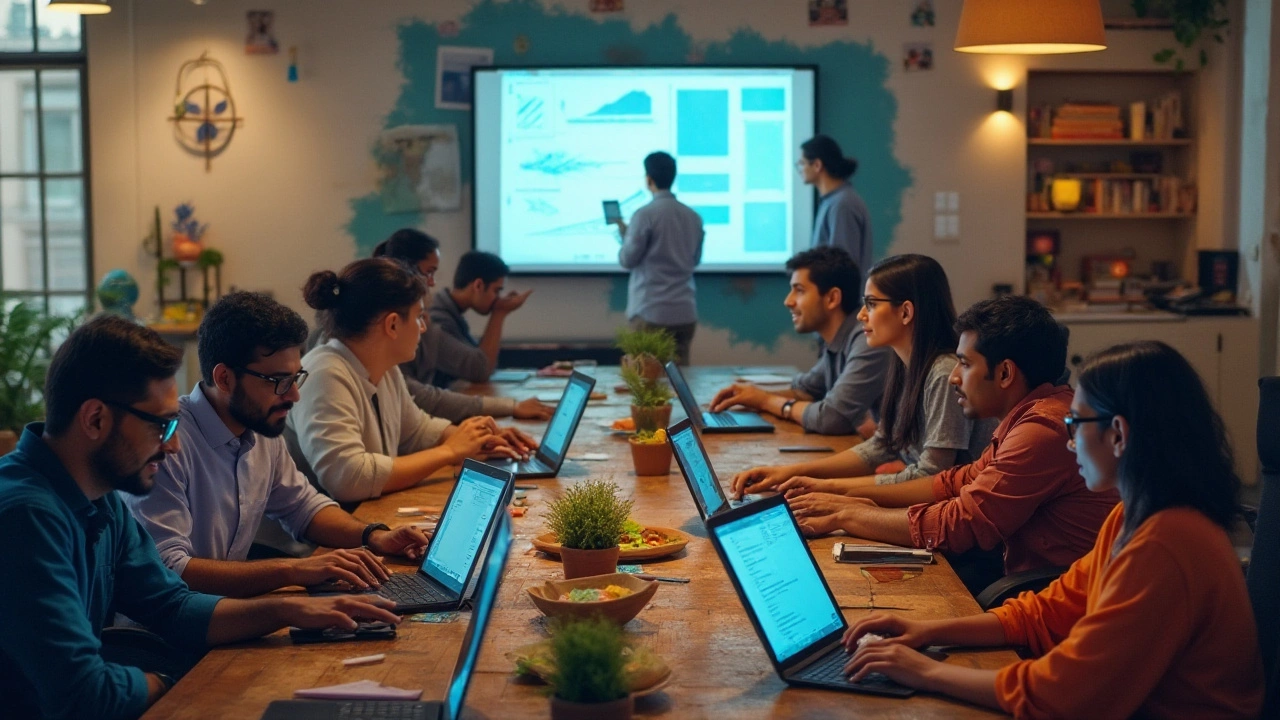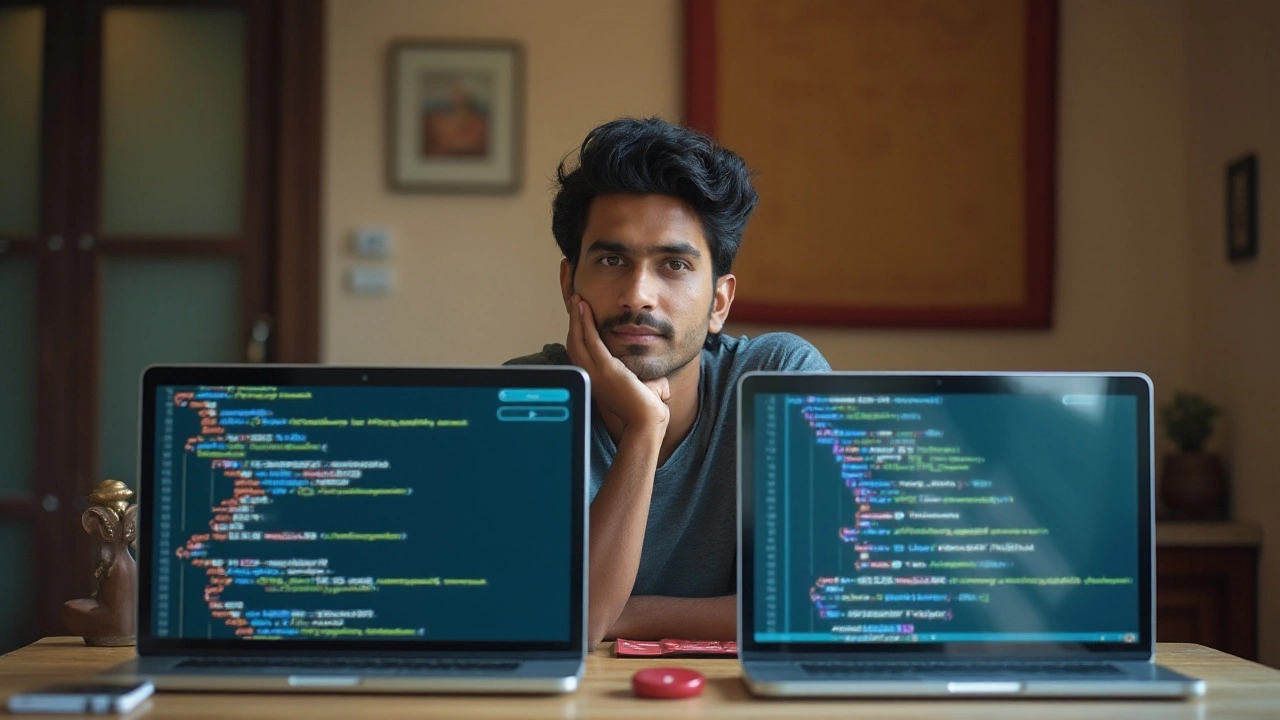The world of technology is vast, filled with a sea of terms that can sometimes leave one scratching their head. Among the most common are 'programming' and 'coding'—often used interchangeably, yet carrying different connotations. So, is it better to first master the art of writing code or dive into the more complex realm of programming?
Learning programming embarks you on a journey of creativity, logic, and structured thought. It has never been merely about typing away on your keyboard; rather, it's about understanding the grand architecture of a software, the flow of algorithms, and the intricate dance of data. Programming is like painting on a vast canvas, where your only limit is your imagination.
Coding, on the other hand, is the skeleton key of modern tech. It’s about crafting the precise set of instructions that your computer needs to follow, line by line, like a meticulous painter focused on the finer details of a masterpiece. Being the cornerstone of programming, coding is a gateway—even if initially daunting, it is immensely rewarding.
Whether you're passionate about building full-fledged applications or simply enjoy the logical thrill of coding, this article will guide you through understanding the differences, advantages, and the right path for your ambitions.
- Understanding Programming and Coding
- Benefits of Learning Programming
- Advantages of Starting with Coding
- Choosing the Right Path for You
Understanding Programming and Coding
The terms programming and coding are often used interchangeably in everyday conversation, but they refer to distinct processes in the software development world. Grasping the difference is crucial for anyone stepping into the tech field, whether they're signing up for coding classes or diving into an in-depth study of programming languages.
What is Coding?
At its core, coding is the act of translating human intentions into a language that computers understand. It's essentially the backbone of communication between humans and machines. Coders write lines of code in specific programming languages like Python, Java, or C++, which are then executed by the computer to perform specific tasks.
It’s an entry point for many into the tech world, as it involves focusing on syntax and the direct implementation of logic. While coding may seem challenging at first, it’s akin to learning a new language, where structured practice and problem-solving lead to growth and expertise.
What is Programming?
Programming, on the other hand, is a broader concept that involves designing and developing entire software applications. It's about constructing a functional, cohesive digital system from start to finish. Programmers not only code but also outline the structure and logic of how software functions, making it a creative and strategic pursuit.
Programming encompasses planning algorithms, designing workflows, and understanding data structures, often synonymous with software engineering. It requires a mindset that can navigate complex problems and visualize end-to-end solutions.
Coding vs Programming: The Differences
- Coding is about translating human language into a machine-readable form, focusing on syntax and sequencing.
- Programming incorporates coding but extends to solving broader problems, designing models, and understanding algorithms.
- Coding can be seen as a subset of programming used to write specific scripts and troubleshoot issues in existing software.
Interestingly, many successful tech professionals started with coding and organically expanded into programming realms, proving that mastering one can be a gateway to mastering the other.
Statistics in the Tech World
According to a survey by Stack Overflow, more than 50% of software developers consider themselves self-taught, indicating that starting with coding is an accessible entry way into tech. Here's a glance at some data:
| Aspect | Percent |
|---|---|
| Coding Enthusiasts | 62% |
| Professional Programmers | 38% |
As technology continues to advance, the intersection between coding and programming becomes even more intriguing, inviting individuals to explore, learn, and create in unprecedented ways.
Benefits of Learning Programming
Delving into the world of programming offers a plethora of benefits that extend well beyond the confines of technology. Programming equips individuals with a universal skill set that is applicable across various industries, making it one of the most sought-after talents in today's job market.
Boosts Problem-Solving Ability
One of the primary advantages of embarking on a programming journey is the development of advanced problem-solving skills. Whether you're debugging code, optimizing an algorithm, or designing a software architecture, every challenge helps refine your analytical thinking and creativity. This ability is invaluable not just in tech-centric roles but in any field where structured thinking is a must.
Opens Up Career Opportunities
The digital era has witnessed an exponential growth in tech-related roles, with almost every sector seeking tech-savvy individuals. From web development to data science, programming knowledge opens the door to numerous career paths.
"Learning to code is beneficial in more ways than I can count. It's almost like a superpower."—PM Theresa May
Facilitates Innovation
If you've ever dreamed of bringing your innovative ideas to life, programming gives you the tools to transform those dreams into reality. Whether you want to develop apps, automate processes, or create the next big social network, programming offers the infrastructure to build and innovate. Consider how Facebook, which started in a dorm room, revolutionized social interaction globally.
Enhances Collaboration
Despite the stereotype of programmers working alone in dimly lit rooms, the reality is that most programming projects require teamwork. Learning to program enhances your collaboration skills, as it involves coordinating with team members, sharing code, and collectively solving problems.
| Year | Tech Job Openings |
|---|---|
| 2023 | 1.5 million |
| 2025 | 2.2 million |
As highlighted in the table, the demand for tech roles, including programmers, is projected to rise dramatically. With benefits like problem-solving enhancement, increased career opportunities, innovation facilitation, and better teamwork dynamics, diving into programming is both a rewarding and strategic move in this technological age.

Advantages of Starting with Coding
Diving into the world of coding opens up myriad opportunities for tech enthusiasts, providing a solid base for understanding the complexities of software development. Starting with coding can be compared to learning the alphabet of any new language, serving as the elemental building blocks of more advanced programming concepts.
Immediate Feedback and Results
One of the most rewarding aspects of starting with coding is the instant gratification it offers. With just a few lines of code, you can create tangible outputs—a simple command can translate into visible, interactive results on your screen. This immediate feedback loop not only boosts confidence but also enhances the learning process, allowing beginners to understand what works and what doesn't.
Foundation for Programming Languages
For those venturing into the tech space with no prior experience, coding provides an approachable entry point. Most programming languages share fundamental principles, and getting familiar with coding helps demystify these concepts. Think of coding as the gateway; once you understand it, learning languages such as Python, Java, or JavaScript becomes much more manageable.
Versatility Across Industries
Coding isn't just for tech companies. With the digitalization of nearly every sector, coding skills are increasingly valuable in industries such as finance, healthcare, and marketing. Understanding how to code can empower individuals to automate tasks, analyze data more efficiently, and even contribute to impactful projects beyond traditional software development roles.
Supporting Career Growth
Starting with coding is particularly advantageous for those who wish to pursue a career in tech. It's often the first step toward various roles, from software development to data science. Employers frequently seek candidates who can demonstrate coding proficiency, understanding its foundational importance in software innovation and development.
Accessible Learning Resources
Furthermore, learning to code has never been more accessible. A plethora of resources—from online courses to interactive coding platforms—are available to help aspirants master the basics. Many of these resources utilize a hands-on approach, which is crucial for grasping coding concepts effectively.
In essence, learning coding first equips you with a practical skill set that not only fuels personal projects but also opens doors to professional opportunities in an ever-evolving digital landscape.
Choosing the Right Path for You
Deciding between learning programming or coding can feel like choosing between two equally appetizing dishes. They each have their flavors, benefits, and unique appeals. To make an informed decision, it’s crucial to consider your own goals, interests, and the time you’re willing to invest.
Identify Your Objectives
Begin by asking yourself what you want to achieve. Are you aiming to develop full-fledged applications, manipulate data structures, or perhaps build software that changes the way people interact with technology? If your goal is to understand and build complex software systems, then diving into the broader world of programming could be more rewarding.
Passion for Problem-Solving
If the thrill of problem-solving excites you—breaking down problems into smaller parts and finding elegant solutions—programming might just be your calling. Programming teaches you to think in algorithms and abstractions, which extends beyond simple code writing.
Immediate Results with Coding
Conversely, if your interest lies in achieving quicker, more tangible results, starting with coding is often more accessible for beginners. You'll start writing code early and see the outcomes of your work sooner. Coding serves as the foundation, where you'll learn the syntax and structure of different programming languages.
Build Confidence with Simplicity
Coding often provides instant gratification as you see your work turn into a running program. This immediate feedback can boost confidence and provide motivation to explore more complex programming concepts in the future.
Consider Your Learning Style
Everyone learns differently—some prefer diving into detailed abstraction, while others thrive when gradually progressing through practical exercises. If you enjoy guided learning with step-by-step instructions, coding may provide a smoother entry point. On the other hand, if you relish in understanding the 'why' behind the scenes, programming can offer a deeper, more comprehensive learning experience.
| Factor | Coding | Programming |
|---|---|---|
| Time to Learn Basics | Shorter | Longer |
| Complexity | Lower | Higher |
| Problem-Solving Focus | Lesser | Greater |
Evaluating Market Demand
The job market also influences this decision. Several roles focus heavily on either coding or programming. Understanding these nuances proves beneficial—software developers and engineers typically require comprehensive knowledge in programming, while web developers and data analysts might focus more on coding skills.
Ultimately, whether you decide to first delve into programming or coding, both paths hold immense value. They form parts of the same tech ecosystem, often intertwining and complementing each other. Equip yourself with the skills that align with your aspirations, and you’ll find that no choice is the wrong one in the ever-evolving realm of technology.


